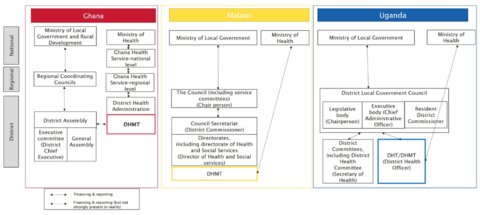How district health decision-making is shaped within decentralised contexts: A qualitative research in Malawi, Uganda and Ghana

District Health Management Teams (DHMTs) are often entry points for the implementation of health interventions. Insight into decision-making and power relationships at district level could assist DHMTs to make better use of their decision space. This study explored how district-level health system decision-making is shaped by power dynamics in different decentralised contexts in Ghana, Malawi and Uganda. In-depth interviews took place with national- and district-level stakeholders. To unravel how power dynamics influence decision-making, the Arts and Van Tatenhove (2004) framework was applied. In Ghana and Malawi, the national-level Ministry of Health substantially influenced district-level decision-making, because of dispositional power based on financial resources and hierarchy. In Uganda and Malawi, devolution led to decision-making being strongly influenced by relational power, in the form of politics, particularly by district-level political bodies. Structural power based on societal structures was less visible, however, the origin, ethnicity or gender of decision-makers could make them more or less credible, thereby influencing distribution of power. As a result of these different power dynamics, DHMTs experienced a narrow decision space and expressed feelings of disempowerment. DHMTs’ decision-making power can be expanded through using their unique insights into the health realities of their districts and through joint collaborations with political bodies.
One of the paper's authors, Susan Bulthuis, said:
“It is remarkable that while on paper health system decision-making is decentralised, this study shows that in reality the national level is still having a substantial influence on district-level health system decision making in Ghana, Malawi and Uganda. This, in combination with the political influence of district bodies through devolution in Uganda and Malawi, resulted in a narrow decision space for DHMTs. Nevertheless, interestingly, this paper also identified opportunities related to decentralisation for increased power in health system decision making of DHMTs in the three countries”.